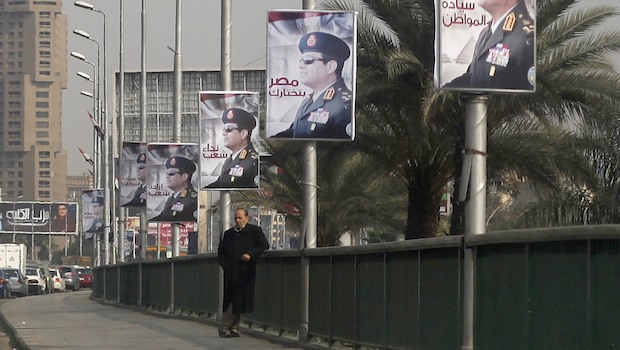With the exception of Hamdeen Sabahy, the leader of the Popular Current Party, no other political figures have announced their official candidacies for Egypt’s presidential elections, the second priority of the post-June 30 roadmap. At the moment there can only be speculation about the intentions of the otherswho have yet to declare their positions, something eagerly awaited by the public, plus a near certainty that popular Field Marshal Abdel-Fattah El-Sisi will soon officially announce his candidacy.
The coming days will be crucial in determining what will happen, as the registration of presidential candidates and the holding of elections take place in March or April. There is not much time left. But whoever the candidates are, Sabahy at least has taken a proactive step in announcing his intentions before the opening of candidate registration. This represents a positive move towards multi-party elections, rather than referendum-style elections, which some had feared. Egyptians experienced something similar in the run-up to the 2011 elections, which later took on more ambiguous dimensions with the results at the 2012 elections that brought former President Mohamed Mursi to power.
Candidates may face a difficult task in an election that features Sisi, given the clear popularity that he enjoys and the general desire for a strong Egyptian president. This desire is only natural in times of crisis. The candidates, however small their chances of winning, will provide a great service to political progress in Egypt by enshrining the principles of multi-party elections. This would be the right way forward for political and democratic progress in Egypt, confirming the principle for all future elections. The situation in Egypt at the moment is not following any historic precedent—many great and popular figures have appeared at times of crisis via multi-party elections.
In light of the status quo in Egypt, the task facing any future president will not be easy. The next president will need an enormous amount of support and trust from the Egyptian street in order to take the country out of the free-fall it is witnessing following three years of crises. This follows years of problems, which can no longer be dealt with according to the old methods, namely postponing or deferring them, and resorting to temporary solutions.
We are not saying anything new about the authority of the president in Egypt, even if the new constitution has reduced the powers of the presidency by limiting time in office to just two four-year terms. However, the scale of the challenges facing the country during this exceptional era requires everybody to participate and work together to get through this crisis and build a better future.
This is why the parliamentary elections, which will take place after the presidential elections, will be no less important in relation to the building of the new republic in Egypt, particularly as they will take place a short time—possibly no more than two months—after a president has been elected. Preparations for the parliamentary elections need to begin now in order to ensure that the experiences of the last parliament—when civilian political powers were distracted by demonstrations and statements that frustrated the hopes of those who were aspiring to see Egypt take a step forward —are not repeated.
Circumstances are different this time around and the experience of a year of Muslim Brotherhood rule has made the public more aware and motivated to avoid falling into the same trap again. Therefore, the smart money is betting that the voting this time will be different to all previous parliamentary elections. However, this will not be enough unless the political parties organize themselves into alliances and coalitions in order to be able to impose themselves on the electoral map. In Egypt, the bigger your electoral coalition, the more chance you have of forming the next government.
The presence of an efficient and dynamic parliament alongside a popular president will give the Egyptian street the required optimism for the future and the willingness to face the difficult decisions that must be taken to overcome these crises.
